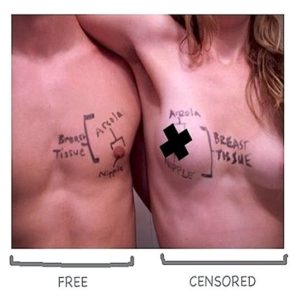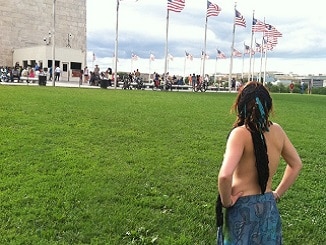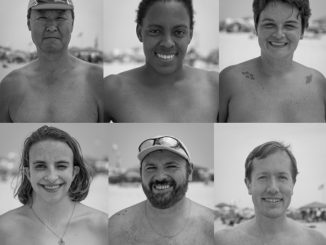Maryland Attorney General Supports Discriminatory Topless Laws But This Is Not Over
On June 14, the Maryland Attorney General’s Office (OAG) issued a “letter of advice” about women’s topfreedom in Maryland. It came out just a few days after the town of Ocean City, MD passed an “emergency” ordinance that outlawed women from going topfree in public.
This letter arrives 10 months after the OAG had received the request for an opinion on this subject. And still, they say this is not their “official opinion.”
As Chelsea Covington, the activist at the forefront of the battle for women’s topfreedom rights in MD, has pointed out, the letter seems to have been haphazardly written up. My guess is the OAG hadn’t spent any of those 10 months actually working on an opinion, but this widely-covered story about OC put some urgency and forced them to respond.
When the advice letter came out, Chelsea told the MC Dispatch: “Why accept the opinion request at all? Now we take the issue to court and see who wins and loses. We could have started this a year ago. The Attorney General stalled for a year, created unnecessary drama and contention between the parties, wrote a wildly incomplete analysis that clarifies nothing and will ultimately cost Ocean City a lot of money to defend an unconstitutional ordinance. Bravo.”

So what does the OAG’s letter say? First off it states the OAG’s opinion – that if topfree laws were challenged in Maryland courts, these laws would not be found unconstitutional on a state or federal level.
They back up their opinion by citing various case laws and try to make the same justifications as Ocean City did in its ordinance. They write:
“But equal protection principles do not require ‘things which are different in fact … to be treated in law as though they were the same.’ Michael M. v. Superior Court of Sonoma County, 450 U.S. 464, 469…”
That was quoting a 1981 U.S. Supreme Court ruling about statutory rape laws in California. At that time, the law only defined statutory rape as a crime committed against a female victim. So be default, only a male could be criminally charged. Michael M. tried to challenge the law on the basis that it was gender-discriminatory and therefore unconstitutional.
He lost after the justices voted 5-4. They basically said it was justified because sexual relations have greater consequences for women than they do for men. They also argued that it would help prevent teenage pregnancies. Their flawed logic was based on gender stereotypes and offered no proof of reducing teen pregnancies.
This case was supposed to be an example of how the law could “legitimately” treat genders differently and still be constitutional. At least as long as the court can justify it. But this was a terrible example. In fact, that CA law was overturned in 1993 and now the CA statutory rape law is gender-neutral.
The AOG letter goes on to say it’s been acceptable for other jurisdictions to discriminate with topfreedom because of the “’real physical differences’ between men and women in this regard.” Of course as I mentioned in the OC article, male and female breasts are almost identical. Many times people can’t even distinguish them if all other gender markers are removed from the picture so this argument is utter nonsense. Though I am sure we’re going to continue hearing it over and over again in the governments’ attempts to justify topfree discrimination.

Then we run into the “public / moral sensibilities” bullshit argument.
The AOG cited United States v. Biocic from 1991 which “held that a federal law prohibiting indecent exposure in national parks could be applied to topless women sunbathing and not men, without violating equal protection:
‘The important government interest is the widely recognized one of protecting the moral sensibilities of that substantial segment of society that still does not want to be exposed willy-nilly to public displays of various portions of their fellow citizens’ anatomies that traditionally in this society have been regarded as erogenous zones. These still include (whether justifiably or not in the eyes of all) the female, but not the male, breast.’”
This is basically an argument for outlawing something just because some people find it “offensive.” It is a disturbing idea to me, as I think it should be to anyone, that this type of reasoning is used as a valid basis for gender discrimination.
In the People v. Santorelli 1992 ruling that made topfreedom legal in NY, judge Vito J. Titone wrote in a concurring opinion:
“Indeed, the concept of ‘public sensibility’ itself, when used in these contexts may be nothing more than a reflection of commonly-held preconceptions and biases. One of the most important purposes to be served by the equal protection clause is to ensure that ‘public sensibilities’ grounded in prejudice and unexamined stereotypes do not become enshrined as part of the official policy of government.”
But we don’t have to go back to the 90’s to find a judge with this opinion. We have a 2017 opinion from a federal judge that beautifully argues in favor of topfree equality!
The opinion comes from a lawsuit in Fort Collins, Colorado. The city had passed a topless ordinance, and this past February, Judge R. Brooke Jackson issued a temporary injunction that blocks them from enforcing it (until the trial).
Judge Jackson’s opinion concludes that FC’s ordinance violates the Equal Protection Clause of the 14th amendment. He pretty much argues the complete opposite of the OAG’s letter.
Here is what he has to say about the issue of offending public / moral sensibilities:
“Throughout this case, Fort Collins has repeatedly pointed out that it is far from unique in enacting laws that criminalize females—and only females—who appear topless in public… and that striking down the law would upset many Fort Collins residents. Unfortunately, our history is littered with many forms of discrimination, including discrimination against women. As the barriers have come down, one by one, some people were made uncomfortable. In our system, however, the Constitution prevails over popular sentiment.”
And about how a topfree ordinance violates the Equal Protection Clause:
“The Equal Protection Clause of the Fourteenth Amendment bars state governmental entities from discriminating between the sexes unless they have an ‘exceedingly persuasive justification’ for doing so. See United States v. Virginia, 518 U.S. 515, 524 (1996); KT.& G Corp v. Attorney Gen. of State of Okla., 535 F.3d 1114, 1137 (10th Cir. 2008). Phrased somewhat differently, the government’s rationale for distinguishing between males and females must satisfy the intermediate scrutiny standard of being ‘substantially related’ to an ‘important governmental interest.’ Id.
This heightened standard bars governments from discriminating on the basis of supposed ‘differences’ between the sexes when doing so is a means of ‘creat[ing] or perpetuat[ing] the legal, social, and economic inferiority of women.’ Virginia, 518 U.S. at 534. Indeed, as the Supreme Court has made ‘abundantly clear in past cases[,] . . . gender classifications that rest on impermissible stereotypes violate the Equal Protection Clause, even when some statistical support can be conjured up for the generalization.’”
Judge Jackson is essentially explaining that thanks to the Equal Protection Clause, government cannot create laws based on gender stereotypes and then justify it by saying “But men and women are different”!
Obviously the sexes do have physical differences, and there are cases where there are valid reasons for differential treatment by the government. But as the judge notes, this is not one of those cases.
He explains that topfree ordinances are not based on physical differences, but on the “generalized notion that, regardless of a woman’s intent, the exposure of her breasts in public (or even in her private home if viewable by the public) is necessarily a sexualized act. Thus, it perpetuates a stereotype engrained in our society that female breasts are primarily objects of sexual desire whereas male breasts are not.”
Judge Jackson goes on to explain how this stereotype and sexual objectification are actually damaging and harmful to women and society. (Thank you, Judge!)
The fight for topfree equality in Fort Collins will continue, but this opinion from Judge Jackson is an important win that’s also going to help with topfreedom cases elsewhere.
At the end of their advice letter, the Maryland OAG equivocates by stating that public morals / sensibilities can change and “quickly.” They also advise law enforcement to consider “context” when enforcing the law and not to interpret it too broadly.
One could argue that popular opinion has already turned around in recent years, especially since the Free the Nipple campaign launched. But whether it changes and how fast it changes should be irrelevant. Topfree laws are discriminatory and unconstitutional, period. And the law should be leading social change, not falling back on stereotypes because it’s “the way we’ve always done it.”
Despite the OAG’s opinion and support of Ocean City, the battle is not over in Maryland…
Chelsea Covington has said she’s retained a national civil rights attorney named Devon M. Jacob. No doubt Chelsea will continue this fight for equality, and we stand with her!
The documents:
January 2018 Update: Chelsea, Felicity and three other women have filed a civil rights complaint against Ocean City for its topfree ordinance!



